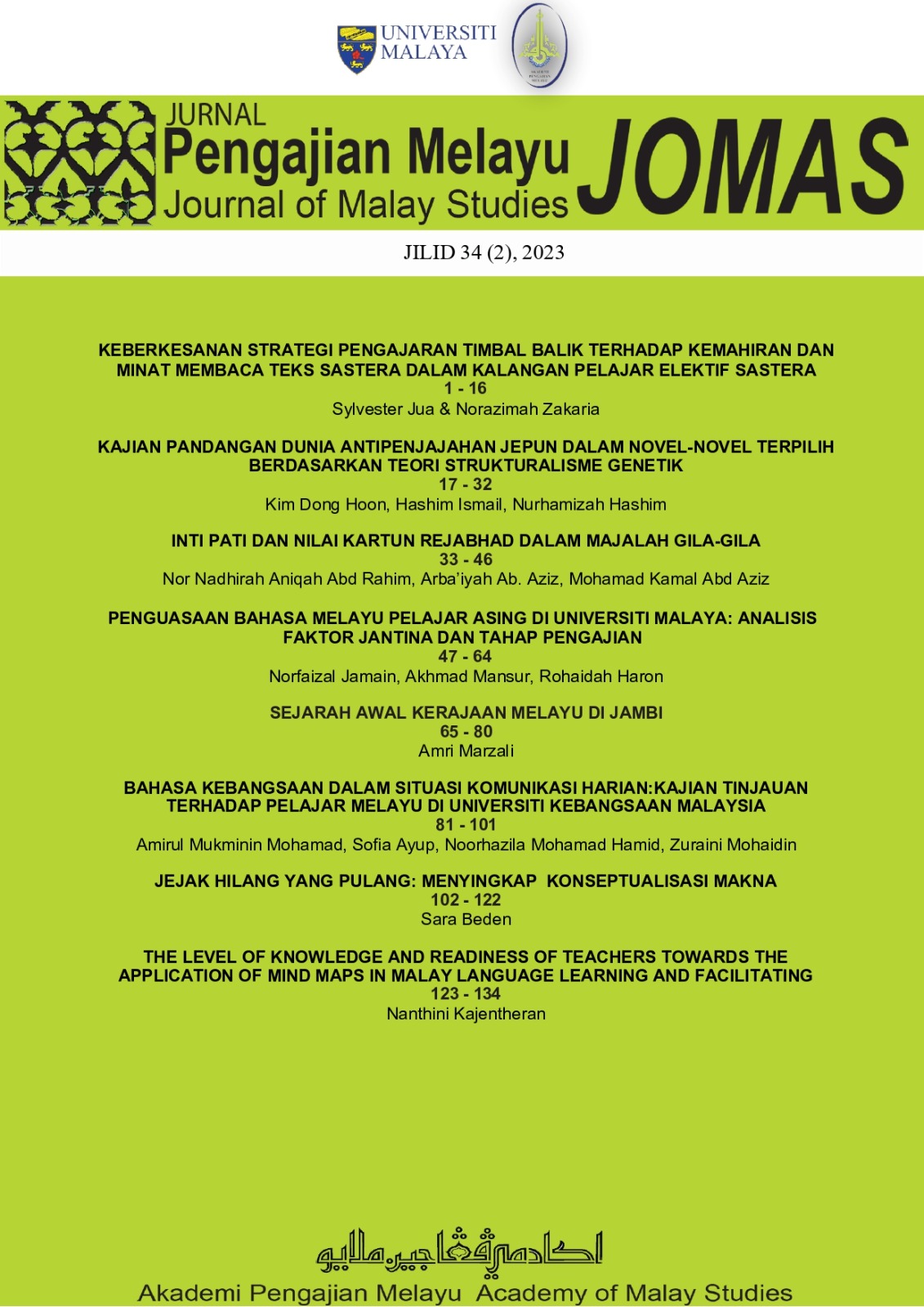KAJIAN PANDANGAN DUNIA ANTIPENJAJAHAN JEPUN DALAM NOVEL-NOVEL TERPILIH BERDASARKAN TEORI STRUKTURALISME GENETIK A STUDY OF THE JAPANESE ANTI COLONIAL WORLDVIEW IN SELECTED NOVELS BASED ON THE THEORY OF GENETIC STRUCTURALISM
Main Article Content
Abstract
ABSTRAK
Selepas zaman penjajahan Jepun, muncul novel-novel bersifat antipenjajahan terhadap kekejaman Jepun. Kajian ini berkaitan dengan penghuraian zaman penjajahan Jepun dalam novel terpilih yang mendedahkan gambaran sebenar pada masa itu. Novel-novel yang dikaji, ialah Sandera, Rindu Aroma Padi Bunting, Patah Sayap Terbang Jua dan Tembok Tidak Tinggi. Objektif kajian ini bertitik tolak daripada untuk mengenal pasti hubungan genetik antara novel dengan keadaan sosial pada zaman penjajahan Jepun. Kajian ini mempunyai objektif untuk menilai pandangan dunia sebagai respons subjek kolektif daripada novel-novel terpilih. Kajian yang menggunakan kaedah kepustakaan dan analisis teks ini, mengaplikasikan pendekatan sosiologi sastera, iaitu kajian pandangan dunia daripada teori strukturalisme genetik. Pandangan dunia merupakan struktur perasaan yang sama dikongsi oleh kelompok tertentu. Dapatan kajian memperlihatkan bahawa para nasionalis memperjuangkan agenda penentangan terhadap zaman penjajahan Jepun dan pandangan dunia yang menyatukan tindakan-tindakan terhadap zaman penjajahan Jepun. Menerusi kajian ini, gambaran yang sebenar zaman Jepun didedahkan dengan golongan nasionalis dan golongan komunis dengan dua pandangan dunia antaranya, pandangan dunia antipenjajah moderat dan pandangan dunia antipenjajah radikal. Kesimpulannya, golongan antipenjajah memperjuangkan untuk kemerdekaan dan kemakmuran bangsa. Konteks sosial ini menggambarkan struktur empat karya terpilih secara dialektik dan antidialektik. Kajian mendapati bahawa novel dan keadaan sosial saling mempengaruhi secara genetik. Kajian merumuskan bahawa setiap genre sastera mempunyai bentuk estetika tertentu dan pemikiran pengarang dapat menentukan kekuatan sastera Melayu di setiap abad.
Kata kunci: zaman penjajahan Jepun; novel zaman penjajahan Jepun; strukturalisme genetik; pandangan dunia antipenjajah
ABSTRACT
After the Japanese colonial period, realism novels that portrayed the cruelty of the Japanese colonial began to appear. This study relates to the depiction of the era of Japanese Occupation in selected novels. The novels are “Sandera, Rindu Aroma Padi Bunting, Patah Sayap Terbang Jua and Tembok Tidak Tinggi”. The research problem of this study revolves around identifying the genetic relationship between the novels and the social context of the Japanese Occupation. This study aims to assess worldviews as collective subject responses in the selected novels. Employing literary research and textual analysis methods, this study applies a literary sociology approach, specifically studying worldviews from the perspective of genetic structuralism. Worldview represents a shared emotional structure within specific groups. The analysis that was conducted managed to achieve the objectives of this study. The findings reveal that nationalists fought against the Japanese Occupation, and worldviews served as a unifying force for actions against the Japanese. Through this study, the true portrayal of the Japanese Occupation is exposed through the perspectives of nationalists and communists, with two contrasting worldviews: the moderate anti-colonialism worldview and the radical anti-colonialism worldview. In conclusion, the anti-colonial groups fought for the independence and prosperity of their nation. This social context
provides a dialectical and anti-dialectical structure to the four selected works, indicating that novels and social conditions mutually influence each other in a genetic manner. Further research recommendations can be made on the Malay authors’ post-war attitude towards novels about colonialism. Such further studies may expand the understanding of modern Malay literary history. Comparative studies can also be carried out between literary works such as wartime poetry and wartime short stories. Each literary genre has its aesthetic form. The attitude of the author who follows the literary genre can also contribute to enriching the study of Malay literature.
Keywords: Japanese colonial era; novels on Japanese occupation; genetic structuralism anticolonialism worldview

